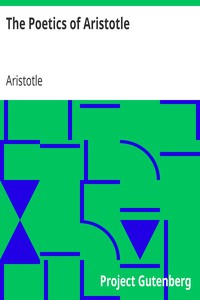The Poetics of Aristotle by Aristotle
"The Poetics of Aristotle" by Aristotle is a foundational philosophical treatise on literary theory, specifically focusing on the art of poetry, notably tragedy and epic poetry. Written during the classical period of ancient Greece, this work examines the nature and principles of poetic imitation and the essential components that contribute to effective storytelling, including plot, character, and diction. Aristotle's analysis serves as one of the earliest known systematic explorations of the mechanics
and purposes of poetry, providing insight into the emotional effects it elicits from its audience. In "The Poetics", Aristotle categorizes different forms of poetry and discusses key concepts such as mimesis (imitation), the significance of plot structure, and the importance of catharsis—the emotional release achieved through pity and fear. He argues that tragedy evokes profound emotions by presenting a noble character's downfall due to a tragic flaw (hamartia) and emphasizes the role of plot over character in creating impactful narratives. By defining essential components of tragedy, including the elements of recognition and reversal, as well as evaluating epic poetry, Aristotle lays the groundwork for the analysis of literature that continues to influence literary criticism to this day. (This is an automatically generated summary.)
Read or download for free
| How to read | Url | Size | |||
|---|---|---|---|---|---|
| Read now! | https://www.gutenberg.org/ebooks/1974.html.images | 125 kB | |||
| EPUB3 (E-readers incl. Send-to-Kindle) | https://www.gutenberg.org/ebooks/1974.epub3.images | 104 kB | |||
| EPUB (older E-readers) | https://www.gutenberg.org/ebooks/1974.epub.images | 105 kB | |||
| Kindle | https://www.gutenberg.org/ebooks/1974.kf8.images | 223 kB | |||
| older Kindles | https://www.gutenberg.org/ebooks/1974.kindle.images | 203 kB | |||
| Plain Text UTF-8 | https://www.gutenberg.org/ebooks/1974.txt.utf-8 | 106 kB | |||
| Download HTML (zip) | https://www.gutenberg.org/cache/epub/1974/pg1974-h.zip | 101 kB | |||
| There may be more files related to this item. | |||||
Similar Books
About this eBook
| Author | Aristotle, 385 BCE-323 BCE |
|---|---|
| Translator | Butcher, S. H. (Samuel Henry), 1850-1910 |
| Uniform Title | Poetics. English |
| Title | The Poetics of Aristotle |
| Note | Wikipedia page about this book: https://en.wikipedia.org/wiki/Poetics_(Aristotle) |
| Note | Reading ease score: 65.7 (8th & 9th grade). Neither easy nor difficult to read. |
| Credits | Produced by An Anonymous Volunteer, and David Widger |
| Language | English |
| LoC Class | PA: Language and Literatures: Classical Languages and Literature |
| LoC Class | PN: Language and Literatures: Literature: General, Criticism, Collections |
| Subject | Poetry -- Early works to 1800 |
| Subject | Aesthetics -- Early works to 1800 |
| Category | Text |
| EBook-No. | 1974 |
| Release Date | Nov 1, 1999 |
| Most Recently Updated | Sep 20, 2016 |
| Copyright Status | Public domain in the USA. |
| Downloads | 3856 downloads in the last 30 days. |
| Project Gutenberg eBooks are always free! | |


